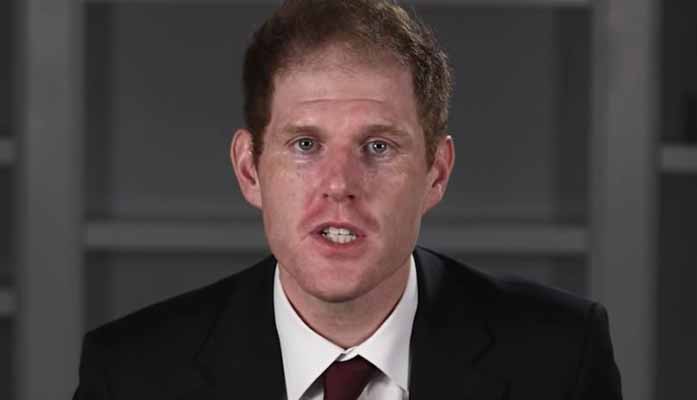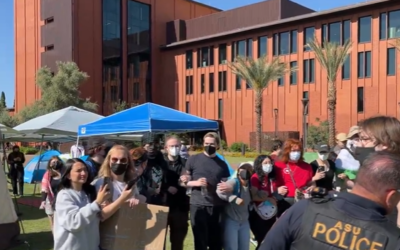By Staff Reporter |
Public records revealed that Maricopa County Recorder Stephen Richer tasked staff with compiling articles and online content pertaining to his personal defamation lawsuit against Kari Lake — Senate candidate and 2022 gubernatorial candidate — as well as topics of personal political interest.
Richer also tasked staff with printing his favorite articles and pieces of online content from these lengthy daily news compilations and organizing them in a binder. Richer admitted in one email obtained by public records that this daily content gathering assignment took a “significant amount of time” for staff to put together.
Richer filed his defamation lawsuit last June against Lake over her claims of him improperly administering the 2022 election. Lake has unsuccessfully petitioned to dismiss his lawsuit; her petition was denied earlier this month.
The county recorder’s staff weren’t just tasked with tracking online chatter about Richer’s personal lawsuit.
Records reveal that Richer has regularly tasked staff with tracking a wide variety of media reports and other online content on topics of personal political interest to Richer, unrelated to the statutory duties of the recorder’s office. This included coverage of other elected officials in Arizona and across the nation; the political landscape for the 2024 election; the indictments against former President Donald Trump; developments in social media; and updates on various public policies.
Some news and online content gathered by staff touched on legal challenges to free speech.
That prompted AZ Free News to ask Richer about the greater nature and purpose of his content gathering assignments, including whether the gathered content inspired, informed, or guided his defamation lawsuit, and why staff hours were dedicated to finding content unrelated to the duties of the recorder’s office.
In response to our questions, a spokesperson defended Richer’s content gathering tasks as consistent with the administration of his predecessors.
“Providing leadership with news clips relating to the office and regarding current events is a standard practice. It has been a practice of this office for the past three years and it was originally implemented by staff from former Senator McSally’s office, where it was a standard practice, who joined the Recorder’s Office in January 2021,” stated the spokesperson. “Recorder Richer values news and being aware of developments within our state and relating to our statutory responsibilities.”
Richer’s office didn’t respond to a repeat of questions left unanswered by their statement: what bearing the content gathered had on Richer’s personal defamation lawsuit leading up to it, and why the recorder tasked staff with compiling news coverage of his personal defamation lawsuit as well as topics of personal political interest unrelated to the recorder’s office.
Richer roping the recorder’s office in on his personal defamation case appears to be related to his interest in securing greater restrictions on free speech. Other emails obtained from public records reflected how Richer began to signal concern over the impacts of free speech on his office in the aftermath of the 2020 election.
In September 2021, the recorder drafted a proposal for greater restrictions on free speech in an unpublished op-ed pitched to The National Review.
Richer argued that free speech restrictions should be expanded, even if the wrongs of 2020 election claims were righted through avenues such as the Dominion Voting Systems’ defamation cases against Fox News and top Trump personalities Rudy Giuliani, Sidney Powell, Patrick Byrne, and Mike Lindell.
Dominion Voting Systems effectively prevailed in their lawsuit against Fox News in 2023, amassing the largest settlement in media defamation history: over $787.5 million.
“[E]ven if Dominion wins all of these lawsuits (and certainly if it does not), it still might be time to revisit our First Amendment jurisprudence,” wrote Richer. “If we don’t, I fear that the morass of disinformation will blanket over legitimate information in all areas of public importance.”
National Review submissions editor Jack Butler rejected the piece over Richer’s proposed restrictions on free speech. Butler encouraged Richer to resubmit the op-ed, sans the call for free speech restrictions; the piece was never published.
“I think we’d still be open to a version of this argument, but that sheds the bits about reconsidering First Amendment jurisprudence,” said Butler. “Even just revising it to express hope that the Dominion lawsuits have their desired effect.”
Although National Review denied the op-ed containing the free speech reform proposal, Maricopa County Community College District (MCCCD) accepted a version Richer drafted for a speech several weeks prior containing a more direct critique of the First Amendment.
In that speech, Richer said that lies and disinformation were the greatest threat to elections and the government; because of that, the recorder characterized the Constitution, specifically the First Amendment, as a “thorn in the side” of his office.
Richer lamented that the First Amendment protects lies, to a certain degree. The Supreme Court ruled this to be the case in their 2012 decision for United States v. Alvarez which pertained to lying about military service, and their 1964 ruling in New York Times Co. v. Sullivan which pertained to deliberate lying about the government.
Certain speech presenting specific harms aren’t protected, such as defamation, fraud, false advertising, perjury, plagiarism, and threats deemed grave and imminent.
However, in that earlier version presented to MCCCD, Richer admitted hesitation to his own desire for First Amendment reforms.
“Yes, I think it’s possible that our First Amendment jurisprudence needs to change,” said Richer. “But I’m hesitant to disrupt something that has served this country so well for so long.”
AZ Free News is your #1 source for Arizona news and politics. You can send us news tips using this link.








